
Inside COP29: The Centre's Top Highlights
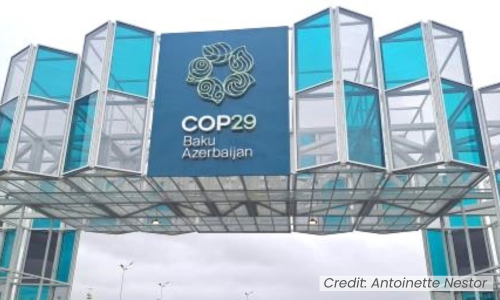
As the capital of Azerbaijan woke on a normal Monday morning during that first week of COP, Baku Stadium was slowly filling with a thick crowd of NGOs, climate scientists, government officials, action groups and academics for the 29th Conference of the Parties. It is an annual climate event that has swelled with attendees over the past few years as the urgency of mitigating global temperatures becomes evermore apparent. However it has also been plagued with criticism as formal international agreements have been slow, if forthcoming at all, whilst major carbon emitters continue with 'business as normal.'
Dr Shaun Fitzgerald, Director of the Centre for Climate Repair, was in attendance during week 1 of COP, to be part of the conversations that need to be had regarding going beyond emissions reduction. Deputy Director, Hugh Hunt, was flying the Centre's flag during week 2 and was able to gauge people's views of climate engineering.
Whilst governments are hesitant to agree necessary measures for the fear of stunting economic growth, global temperatures are creeping up above 1.5C and summer arctic ice will be non-existent in a few short years. Therefore, attending COP, a global platform, is the place for climate interventions to be discussed, whilst there is time to research the viability of these technologies.
Here is a summary of what the Centre got up to at COP:
Week 1
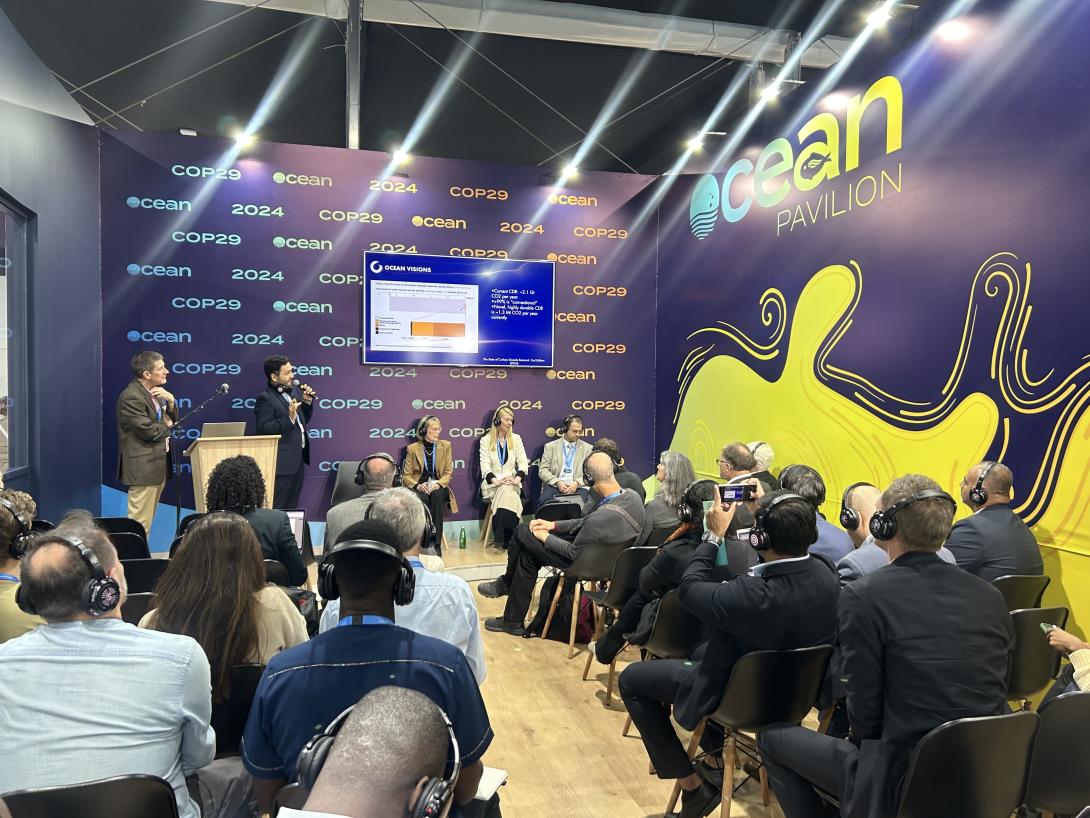
Despite a rocky start to Shaun's travels to Azerbaijan (he arrived to find his hotel cancelled!), the week was kicked off with the Centre for Climate Repair hosting an event in the Ocean Pavilion with a panel discussing ocean-based carbon dioxide removal (mCDR). With a growing investment in commercial Carbon Dioxide Removal (CDR) markets, interest in mCDR is increasing rapidly.
This event was chaired by Dr Shaun Fitzgerald, and on the panel was Leonardo Valenzuela Perez from Ocean Visions, a non-profit that looks for ocean-based climate solutions, Margaret Leinen from the Scripps Institution of Oceanography at UC San Diego, Jill Storey from the World Ocean Council and Paul Morris from Woods Hold Oceanographic Institution.
A well attended event saw a lively discussion on mCDR and research that is currently being undertaken across the organisations.
A link to the full video from the Ocean Pavilion event is available on our YouTube channel here.
The week continued with Shaun attending several events, including the Yongo Press Conference, and the second day concluded with Shaun sitting in on a side panel event entitled Carbon Dioxide Removal: Policy Considerations for Responsible Deployment on Land and in the Ocean. On this panel, Shaun was joined by Barry Vesser from The Climate Center, Jill Storey from the World Ocean Council and Dr Werner Kutsch from the Integrated Carbon Observation System European Research Infrastructure Consortium (ICOS-ERIC).
Shaun's segment on the panel can be viewed, in full, on our YouTube channel here.
One particular high point was when Shaun spent Wednesday listening to the 2028 and 2029 COP High-Level champions in the main plenary sessions. They highlighted the need for inclusion of different communities across the world as well as the need for us to start working with nature to help the climate.
A moving session, they spoke of the fact that indigenous people are often at the front line of climate change but are the least responsible for causing it. Although they represent only 5% of the world population, they look after the majority of the world's terrestrial biodiversity. Therefore there is so much we need to do to support these communities and provide justice.
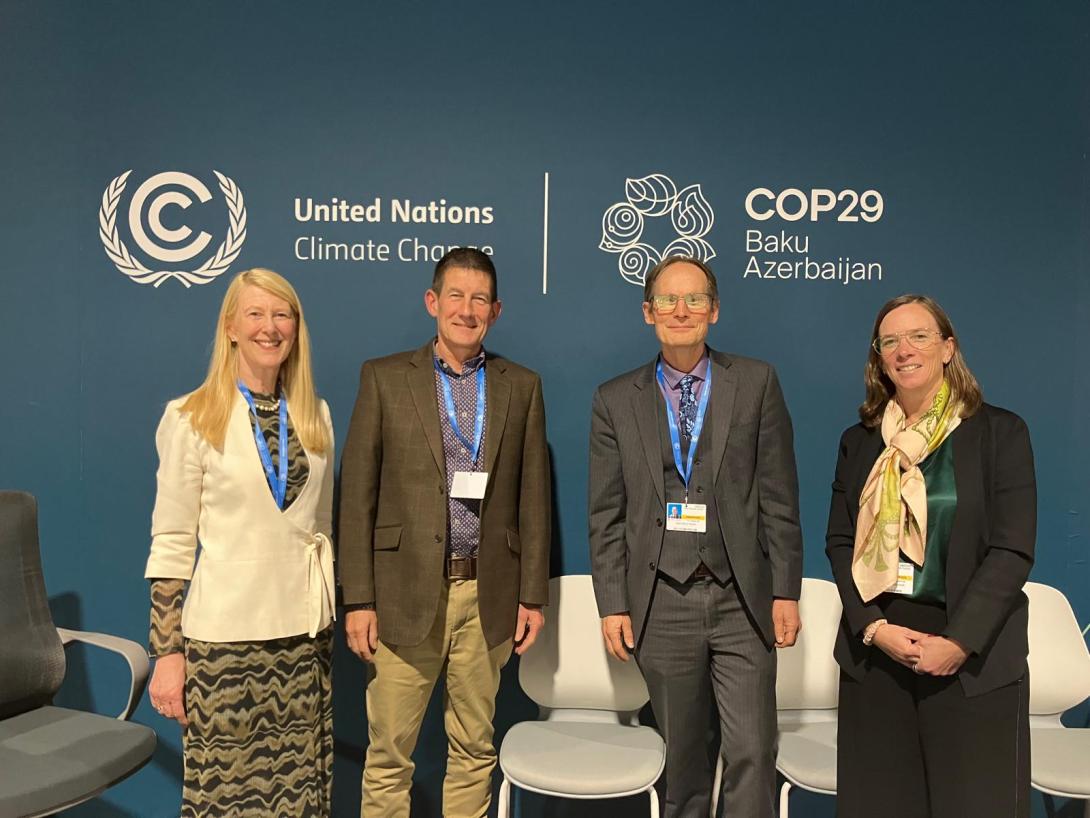
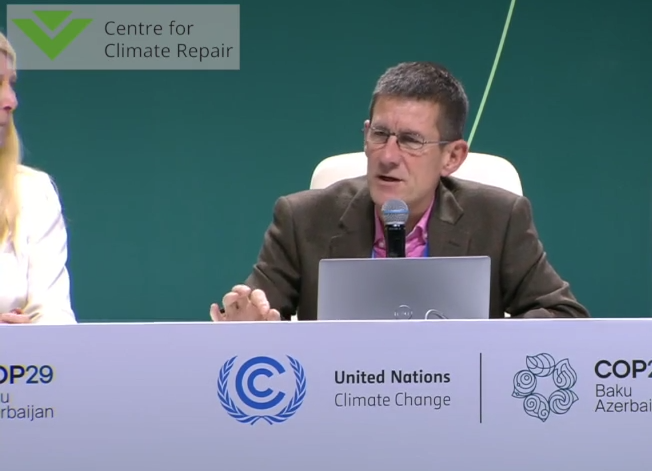
On Thursday, Shaun participated in a session on going 'Beyond Emissions Reduction' in association with the Climate Emergency Forum. There is so much focus on reducing emissions and net zero that we can, at times, forget that we have committed ourselves to ongoing warming, even if we were to stop emitting today. Therefore it is a matter of creating a deeper deficit to account for this.
The full session can be seen on our YouTube channel here.
A lively discussion was had which saw Shaun fielding questions relating particularly to Solar Radiation Management (SRM). A controversial topic, that inevitably sparks debates, needs to be discussed and researched. If we cannot go beyond net zero ourselves (which does not look likely), then we need to start looking at alternatives, rather than discounting them completely.
Getting to net zero is insufficient, we need to get to net negative
As another day of COP was being wound up, Shaun attended an event by Australian Businessman, Andrew Forrest, who spoke about the need for us to urgently stop relying on fossil fuels. He believes that 'Real Zero' by 2040 should be our aim. A major challenge but also a visionary and worthy goal. His main point is that we must not let the fossil fuel companies off the hook. Shaun was joined by Professor Rob Miller at this event who is a Professor of aerothermal technology and Director of the Whittle Laboratory at the University of Cambridge. Inevitably, you will always see someone you know at these events!
Between sessions, Shaun managed to meet again with the UN Ambassador to the Islands of Palau, llana Seid. At COP28, Ilana spoke passionately about sea level rise affecting the islands and she is eager to see whether Sea Bed Curtain research can be a potential way to protect them whilst we get greenhouse gas emissions to an acceptable level.
He was then off to the next panel discussion, this time on Climate Finance for Sustainable Regions and Cities. With Finance being a focal point for COP29, this was a pivotal event with the Former Minister of Foreign Affairs and of Defence of Ecuador, Maria Fernanda Espinosa Farces, speaking alongside Dr Ebun Akinsete (Co-Chair SDSN Greece), Dr Hyginus Leon (Development Bank for Resilient Prosperity), Dr Conrad Landis (Athens University of Economics and Business and Professor Jeffrey Sachs (Columbia University).
Discussions like these needed to be had as there are regions that do not have the financial means or support to focus on net zero or even become more resilient against climate change. Unfortunately, it is some of these regions that are hit the hardest by the effects of Climate Change.
Shaun was also able to catch up with Youth Group, Operaatio Arktis, who are young voices supporting research into climate engineering as a potential tool for mitigating rising global temperatures. It is becoming evident that younger generations are open to discussing alternative research, as they can see that emission reductions are no longer enough.
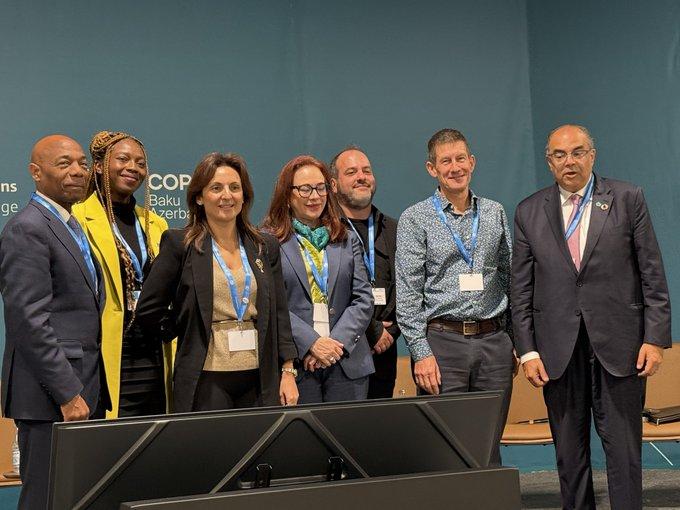
See Operaatio Arktis' thoughts of COP29 and what they believe are the attitudes to geoengineering at COP here.
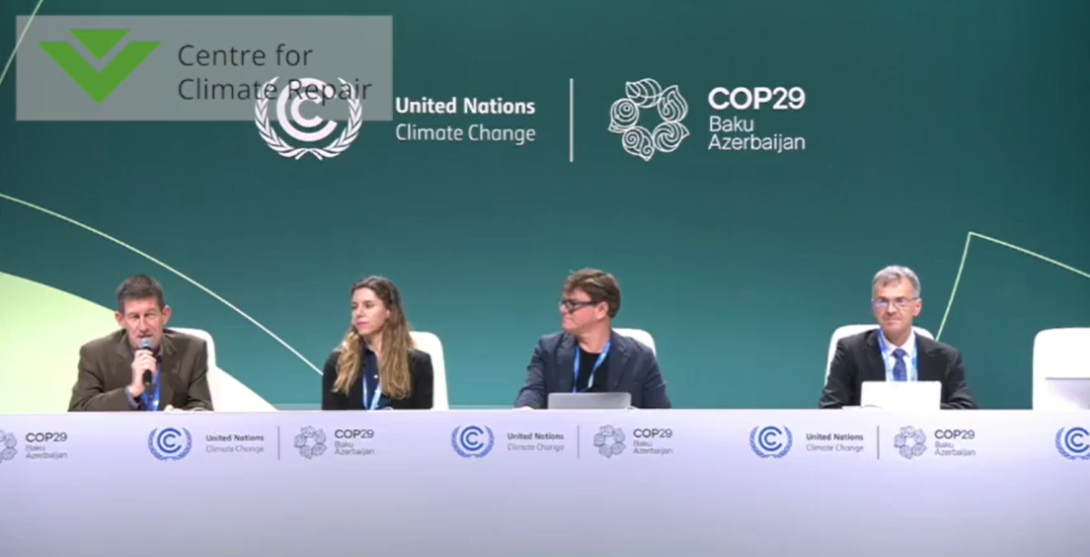
On Shaun's final day at COP, he was invited to speak on a panel which evaluated the progress on forest, land use and agriculture emissions, following the Emirates Declaration on Sustainable Agriculture made at COP28.
Chaired by Climate Journalist, Nick Breeze, these discussions focused on what can be done to scale and accelerate carbon reduction from forestry, land and agriculture. Shaun, who works on the Cambridge Landscape Regeneration project at the Centre for Climate Repair was able to provide useful insights into areas that are being researched around Cambridgeshire.
The panel segment by Shaun can be seen on our YouTube channel here.
Shaun's COP visit came to an end when he had to make a quick exit in order to catch his flight home. His final thoughts on his week at COP can be found here.
Week 2
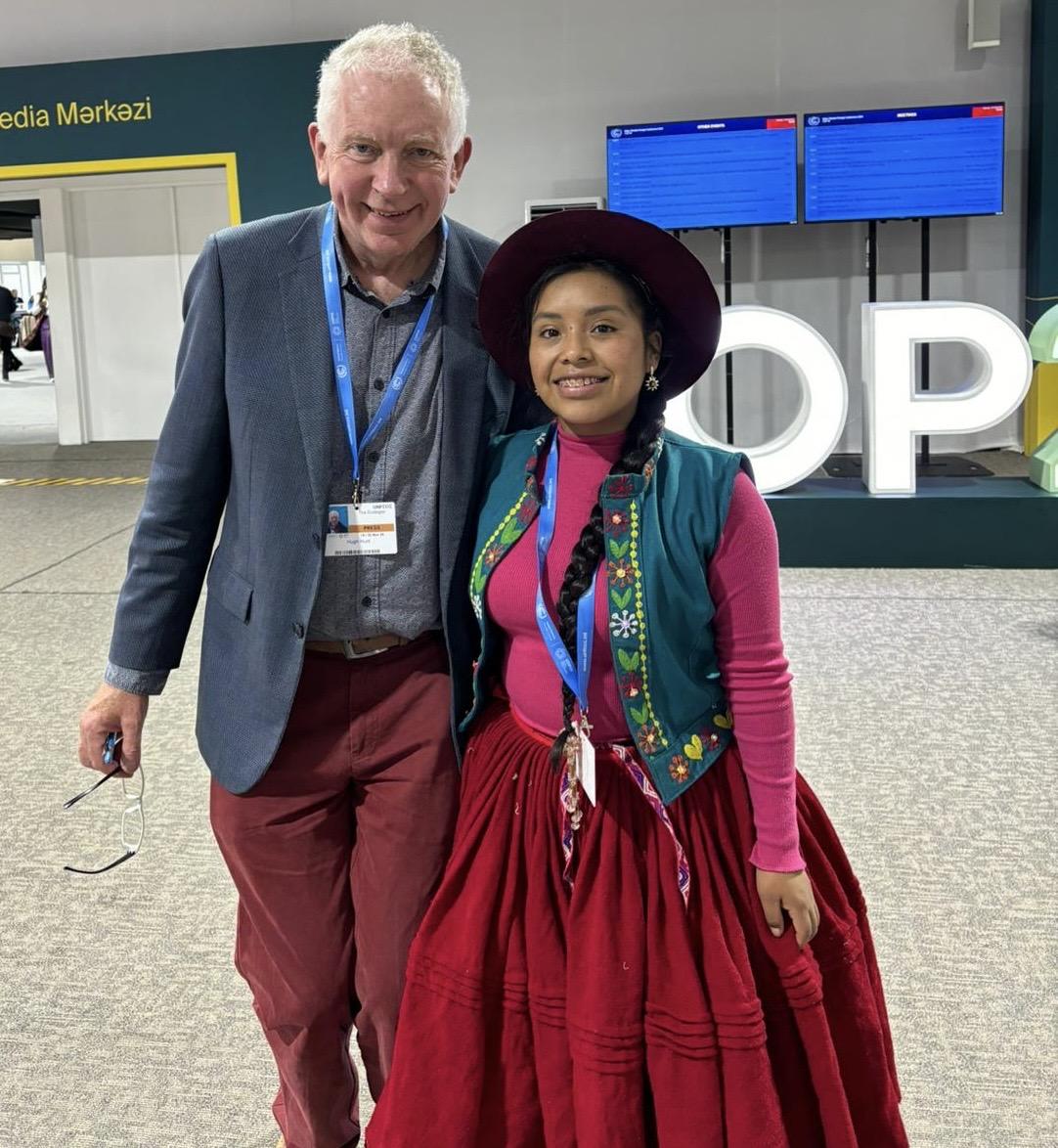
Deputy Director, Hugh Hunt, arrived for Week 2 of COP and wasted no time in hearing people's views on climate change and gauging their attitudes towards climate engineering.
Hugh managed to catch up with one particular interesting interviewee, Rabbi Yonatan Neril who is an interfaith environmental advocate, NGO Director and Rabbi. He is the Director of the Interfaith Center for Sustainable Development based in Jerusalem. Hugh was able to get his thoughts on how he approaches the (somewhat) depressing topic of climate change to others as well as his perspective on geo-engineering.
We can sometimes think that topics such as these are reserved for scientists and policymakers but climate change affects us all and COP brings together a plethora of people from diverse backgrounds, who all have a right to be heard.
You can see Hugh's full interview with Rabbi Neril on our YouTube channel here.
Hugh was also able to catch Soledad Secca Noa (pictured) during her protest at COP as she spoke passionately about her native Andean community. She is the first indigenous Quechua content creator and speaks widely about the risk of extinction of the traditional cultures and practices in smaller communities that are vulnerable to climate change. These are the people who should be in the rooms of major negotiations.
Not stopping there, Hugh also met up with Johann Hoschtialek from the Caribbean island of Grenada to get his views on how climate change is affecting his island and what is action is being implemented by the youth there.
The full interview with Johann Hoschtialek is available on our YouTube channel here.
On day 2 of week 2, Hugh was invited to speak on the Climate Emergency Forum panel, where climate engineering was discussed. Climate Engineering, or Geo-engineering, is a hot, but controversial, topic at the moment where discussions are being had outside of negotiation rooms regarding its place in climate plans but it is not being considered in the COP negotiation rooms, where it matters most.
Hugh discussed the Napkin Diagram (an explanation of it can be seen HERE) together with the role that climate engineering, such as Solar Radiation Management (SRM), needs to play in getting global temperatures down. One particular interesting point to come out of these discussions is whether SRMs can help alleviate the slowing down of the Atlantic Meridional Overturning Circulation (AMOC), which, if it shuts down completely, can bring about cataclysmic climate change in the Northern Hemisphere.
To watch the full panel discussion, head over to our YouTube Channel HERE.
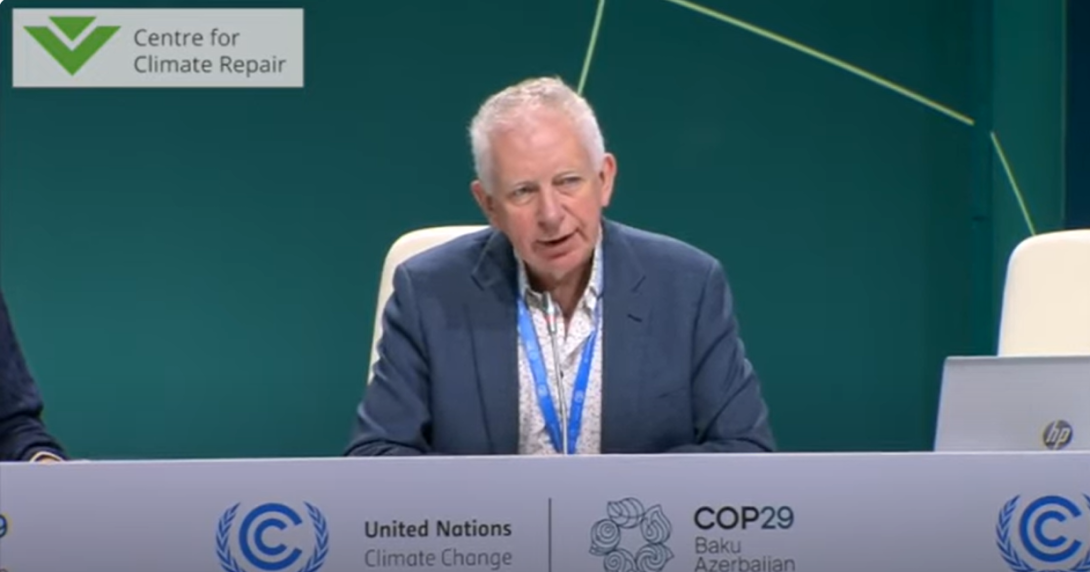
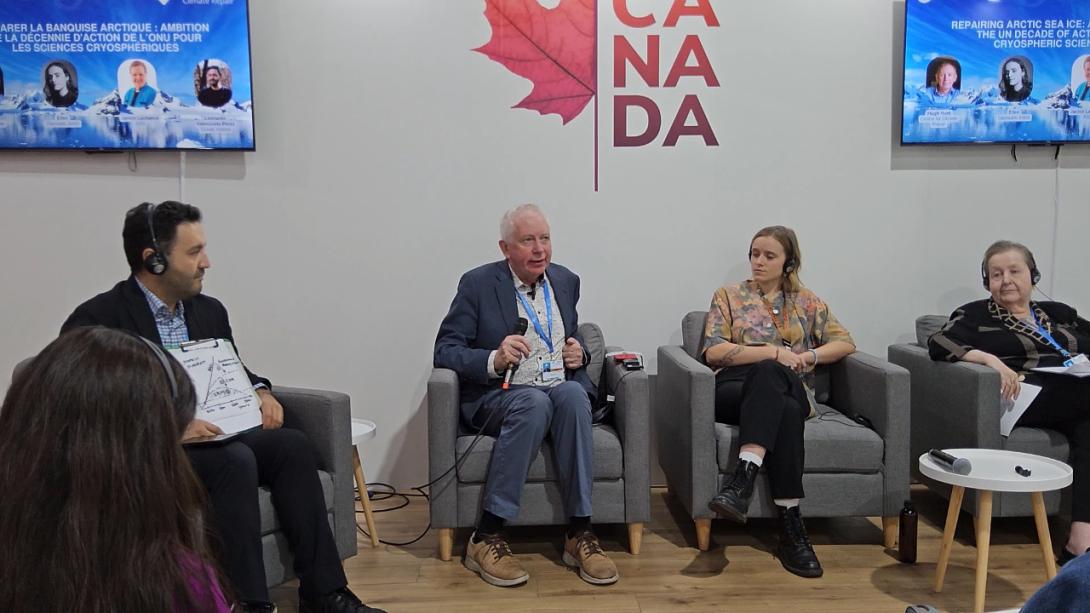
Climate Engineering doesn't solely focus on Solar Radiation Management technologies to bring down global temperatures but also interventions to help preserve or reverse diminishing Arctic Sea Ice. Within the next decade, we are heading towards an Arctic Ocean ice-free summer which would mean the vital ice covering the ocean, needed to reflect solar rays back into space, would be all but gone. Hugh therefore was given the opportunity to speak at the Canada Pavilion later in his week at COP29 where science-based interventions under the UN Decade of Action for Cryospheric Sciences, was discussed.
On this panel was Ocean Visions' Director of International Partnerships, Inuk Advocate - Jukipa Kotierk, CEO of the Global Methane Hub and Director of the India Program from the Institutute for Governance & Sustainable Development.
As this was a 'silent' discussion, meaning that attendees heard what was being discussed through headphones, a recording of this session is unavailable.
As COP29 and Hugh's week came to a close, it gave him a chance to reflect on what came out of the first week of COP and also what he experienced and heard in the second week. In his own words, he stated
On Climate Finance:
"In past COPs, discussions to move away from fossil fuels and reduce methane seemed to be forgotten as there are now no real discussions about these. Yes, USD$300billion has been allocated for vulnerable countries but it hasn't been decided where this money should come from. How much do fossil fuel companies make? Fossil fuel companies have taken so much from these countries, why do they not give more back?"
Article 6 and Carbon Accounting:
"Nations should take action by implementing carbon tax but start by taxing low, for example with aviation implementing a 0.5% carbon tax. At least the mechanisms will be in place and are able to evolve. Not having them in place at all means the outdated COP process of having to get all 195 countries to agree before anything is implemented, means nothing is implemented."
On Geo-Engineering:
"There were no discussions in the negotiation rooms on geoengineering. There is a disconnect between what they think can be achieved and ultimately what can be achieved.
The biggest disappointment, for me, is that they are completely unable to address the elephant in the room. That we need to go beyond emissions reduction.
There was more energy outside of the negotiation rooms with people being willing to discuss geoengineering than in the rooms themselves."
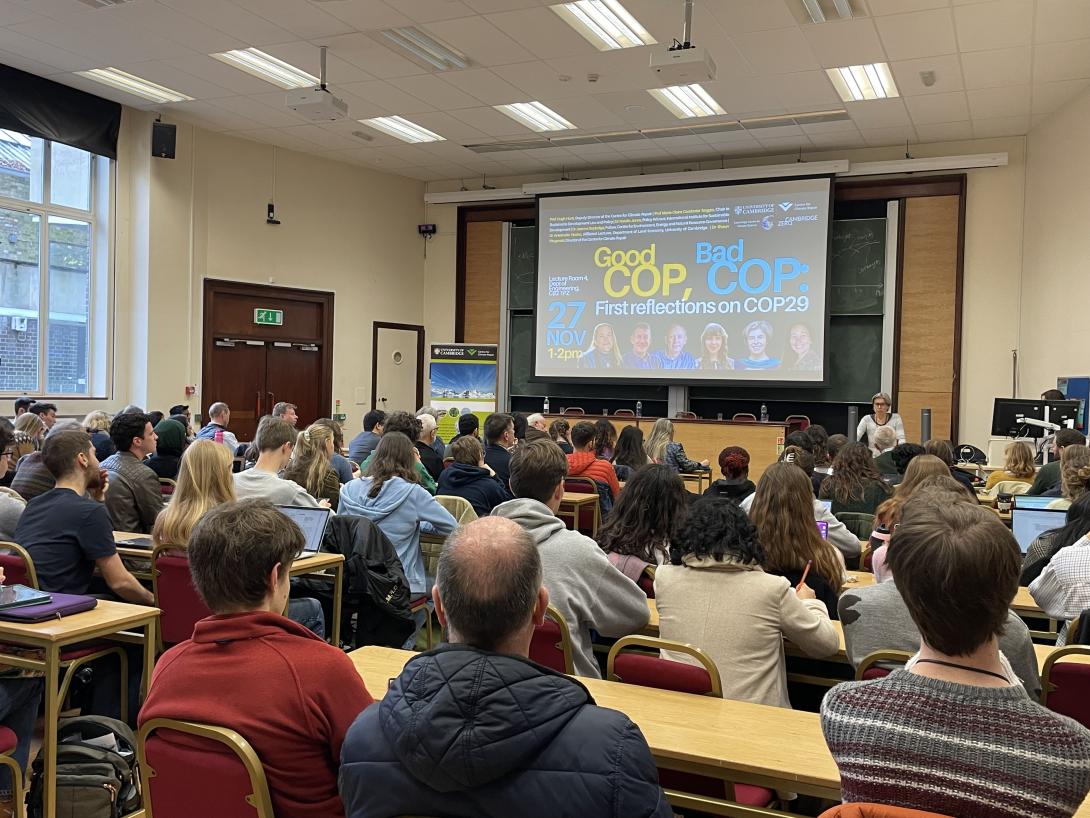
Back in Cambridge, the Centre for Climate Repair hosted a Post-COP29 reflections seminar and the large interest in this event shows that COP affects everyone. People are becoming more and more interested in what our governments and policy makers are doing to address climate change.
We are no longer accepting that two weeks of having access (in the same building!) to well-informed scientists, academics and organisations can result in nothing being achieved or progress not being made. We now have a vested interest. If this means having the hard conversations about geo-engineering, which none of us hoped we ever had to have, then so be it.
Ignoring our new reality will not save us or our home. This is our planet and we need to start taking action that benefits us all, now more than ever.

